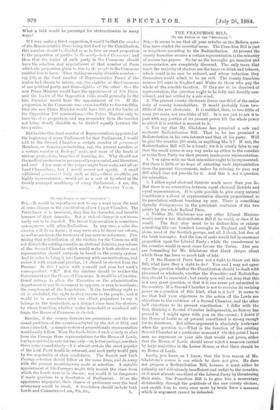[To THE EDITOR OF THE " SPECTATOR."] SIR,-It would be
superfluous now to say a word upon the need of some change in the constitution of our Upper Chamber. The Peers know it is imminent, they fear its character, and tremble because of their demerits. But a radical change is not neces- sarily one to be dreaded. The truest Conservatism is sometimes synonymous with ultra-Radicalism. In any case, a calm dis- cussion will do no harm ; it may serve also to direct our efforts, as well as moderate the tremours of less nervous reformers. Pre- mising that redistribution of the electors for the Commons will not disturb the existing counties as electoral districts, any reform of the Second Chamber which would make it both elective and representative should certainly be based on the county system. And in order to bring it into harmony with our institutions, and endow it with senatorial prestige, i t should be elected from the Peerage. In this I agree with yourself and your last week's correspondent, "M?' But the electors should be neither the Government nor the House of Commons. It would be a Constitu- tional outrage to allow the Executive or the administrative department of any Government to appoint, or even to nominate, the complement of the Legislature. If the hereditary right to sit is abolished, the right to elect reverts to the people; and it would be in accordance with our oldest prejudices to say it belongs to the freeholders, as a distinct class from the electors, by whose franchise, whether under household or manhood suf- frage, the House of Commons is elected.
Besides, if the county districts are preserved,—not the divi- sional partition of the counties adopted by the Act of 1832, and since extended,—a simple system of proportionate representation would easily follow. Were the freeholders of each county to elect from the Peerage three representatives for the House of Lords, but be restricted to vote for two only—or, better perhaps, use their three votes cumulatively—it is almost certain the most popular of the local Peers would be returned, and each party would gain by the popularity of their candidates. The Scotch and lrish Peerage selection should follow on the same lines, and do away with the present unsatisfactory mode of selection. A suitable appointment of life-Peerages might fitly recruit the class from which the Lords were to be chosen ; nor would it be dangerous if made previous to a dissolution of Parliament. Were the appointees unpopular, their chance of preference over the local aristocracy would be small. A dissolution should include both
Lords and Commons.—I am, Sir, &c., L.


































 Previous page
Previous page